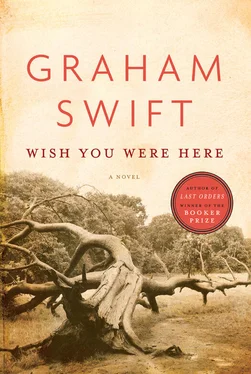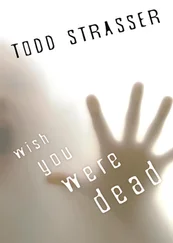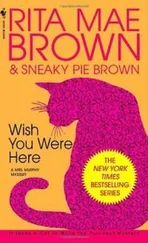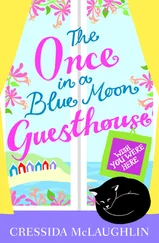He’d had the thought, later, that the army ought to have its own equivalent of a squad of MAFF slaughtermen to come as quickly as possible and finish off cases like Willis. It would be a mercy, it would save a lot of trouble. It would only be doing what any soldier might sign up for. If you’d do it for an animal.
He’d got the picture of Willis out of his head by remembering that cow. Strange, that it was just a cow on the telly. But then they , B Company, were just pictures on the telly for most people back home, though they didn’t get the pictures like they got of Willis. And that picture on the telly at Jebb wasn’t funny. There were real cows across the yard. It wasn’t just a picture, even if they didn’t know the thing was coming smack in their direction. You might have said they’d been served notice.
Or he had. Though he hadn’t yet made up his mind. He’d make up his mind down in Barton Field. What you’d do for an animal. The cow disease, when it came, was like some not quite final warning. A disease had already been eating away at Michael Luxton and was starting to eat away at him, Tom, too. He’d got it from his dad. Jack was made of tougher stuff, maybe, better stuff than he was. A good brother, a better brother. And a better father, sometimes, than his father.
But after that morning with Dad and Luke in Barton Field he wasn’t going to stick around any longer than he needed, with bad thoughts in his head that he might just one day put into action. Let the cow disease seem like his reason. What should he have said? Why don’t we both do it, Jack, you and me together, why don’t we both just hop it? But he’d looked hard into Jack’s eyes and seen, first, that what he did actually say would be safe with Jack, safe as blank ammunition, and, second, that Jack had never even dreamed of it himself.
Well then, Jack could keep it. Keep what he was leaving. Let that be the deal. He’d never break it or ask for his share back. If that took away the weight of guilt that settled inside him as soon as Jack said, there in the parlour, ‘You can rely on me, Tom.’ If it made Jack the good brother and him the bad one, so be it. If it made Jack the fool and him the smart one, so be it. He’d slipped out of the farmhouse, like a fox from a henhouse, at three a.m. on his eighteenth birthday. His mum had told him once that he’d been born at three a.m., but that had nothing to do with it, it was just a coincidence. And Jack had told him that ‘born’ wasn’t quite the word for it anyway. Jack had said, ‘That’s when you finally came out.’
He had a backpack and he was wearing all those layers — less to carry — against the cold. He had rations (he’d better get used to that word) hidden in the Big Barn. And he had Jack’s birthday card, which weighed next to nothing but was like an extra load of blame to carry with him. A big gold ‘18’ and a big ‘Good Luck, Tom’ inside. He’d kept it for a long while, hidden in his locker. Signing up on your birthday wasn’t exactly like a birthday. If he’d wanted punishment, to go with his guilt, then he’d get it in the army.
But he certainly no longer had the card by the time he was sitting in that pub, watching those cows burning on the telly. Though maybe the ‘Good Luck’ still applied, now as then. It had stopped him, so far, from being like Willis.
Apart from the card, only three other written messages had ever come his way from Jack. Which wasn’t a complaint, since he, Tom, had never written back — or only the once, and briefly. He’d very quickly found out that he just wanted to be out of communication in this world he’d chosen, this world of strangely unresented punishment, his whereabouts unknown.
Now the World is Yours.
The first letter from Jack had been after two weeks or so, and was just a line hoping he was okay and saying that everything at Jebb was fine — which was surely Jack being a well-meaning liar. And then, since he hadn’t replied to that, there was a long, long gap. It looked like that was that. They’d really said goodbye to each other and known it, that December afternoon in the milking parlour. Meanwhile, he’d been moved around a bit anyway.
Then those two letters had come, soon after each other, the first looking like Jack might have spent a whole week writing it and torn up several versions along the way. But the main item was perfectly clear. That Jack was all by himself now, not counting Ellie (assuming Ellie was still a feature, and how might she not be?). The old man had cleared off too, so it seemed, in a manner of speaking. And then the second letter had come soon afterwards, about the funeral, since that had to be delayed. And that had included that other item of news: that Michael had left the whole farm — though Jack had seemed to want to emphasise that there was a whole heap of debt to go with it — to Jack and Jack only. Well that was no surprise. That had even been the deal.
And he hadn’t replied to either letter. He hadn’t got on the phone to Jebb Farm. He hadn’t done a single thing about either letter, though he’d stared at them both long and hard enough. Those letters reached him, as it happened, in Germany. Before Bosnia. It would have been difficult, but, with that delay for the funeral, not impossible. And there was such a thing as compassionate leave. And he’d felt compassion, definitely. For his brother.
But he hadn’t done a thing. He hadn’t applied to the CO. He imagined the CO’s face. My old man has shot himself.
He hadn’t lifted a finger. It was a bastard thing to do to Jack, but then, maybe, it had been a bastard thing he’d done in the first place, that night in December.
All yours, Jack. Now it really was, and Ellie’s too, if Jack had any sense. And good luck to them. But it wasn’t his ticket or what he was made for, he knew that too now.
He was a private in B Company, earmarked for the sniper section, currently stationed in Germany, occasionally on active duty with a Helga from Hanover, when he might have been the owner of fifty per cent of Jebb Farm, of a hundred and sixty acres of England. So be it. He couldn’t go back on the deal, and he couldn’t go back anyway to the place itself, compassionately or otherwise. Couldn’t have gone back to that churchyard to stand by the grave, even for his brother’s sake, and look down and think: it was a fine line, it was a fine bloody line. And Jack maybe thinking it too. And maybe if he didn’t show up and didn’t even send a message it would be like a clear enough last signal. All yours, Jack. Forget about me.
He’d stared at each letter in turn. So his father had done what no one else, now, would have to have the decency to do for him. He’d done the decent thing himself. He’d stared at both letters together. Reading them was a little like reading Jack’s face, but he’d never have to do that any more. He put the letters away, and he never did speak to the CO. Later, he found an opportunity privately to burn them. The barrack room had an old-style stove with a lid. Simple. A small fire, compared with piles of cattle going up in flames. And a small matter, he’d come to think, compared with some of the things that come a soldier’s way. Bosnia. He’d watched those cattle burning on the telly six years later, in the spring of 2001. And it wasn’t so long afterwards that a couple of planes had flown into a couple of big towers — another TV picture to remember — giving a whole new meaning to the act of suicide and having a range of consequences, including ones for British soldiers, which would make a spot of cow disease seem piddling.
And all he’d wanted was the get-out, the complete alternative package. No finer reasons. He’d never once said to anyone that he’d had a great-uncle who’d got the DCM. (Posthumous.) When he’d walked, that icy night, with his backpack, past the war memorial, he’d never turned his head. He hadn’t felt brave, or even that he was doing something that really took so much initiative.
Читать дальше








![Питер Джеймс - Wish You Were Dead [story]](/books/430350/piter-dzhejms-wish-you-were-dead-story-thumb.webp)



